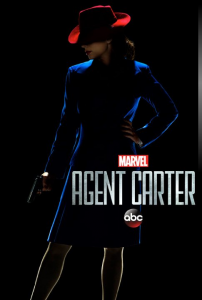agent carter: the hero we deserve
Agent Carter, Marvel Universe’s first female-led adaptation, offers a break from your regularly scheduled programming. It’s a wonderful mash-up: part espionage thriller, part comic-book adaptation, and part historical drama. There are secret identities, car cashes and fist fights, gadgets and conspiracies, and crime fighting teams (all in the first episode!). Most excitingly this television tie-in is not led by another straight, white man, but follows the adventures of Agent Peggy Carter (Hayley Atwell).
Audiences were first introduced to Peggy Carter in the Captain America movies, with the no-nonsense British Intelligent agent helping Steve Rogers (a.k.a. Captain America) save the day. It’s now 1946: Steve Rogers is sleeping at the bottom of the Arctic Ocean, Peggy is working for Strategic Scientific Reserve (SSR), a U.S. government spy agency, and despite the fact she helped overthrow a bona fide super villain (and his army of evil Nazi minions) Peggy is now essentially a glorified secretary. Her primary duties involve filing, answering the phone, and resisting the urge to strangle her chauvinistic co-workers.
Enter Howard Stark, Peggy’s wartime comrade, who has been accused of selling his inventions to the enemy. SSR are on the hunt for a fugitive Stark, who convinces Peggy to become a double agent. Peggy and Jarvis, Stark’s ‘go to’ man, team up to clear his name. Cue hi-jinks.
The central obstacle in Peggy’s world isn’t a super villain, but something far more ordinary and insidious: sexism. The creators of Agent Carter have tackled the issue of sexism head-on, choosing to highlight the backlash women faced following World War Two. In one of the opening scenes, Peggy’s roommate Colleen talks about how they’re laying off experienced women at the factory to make way for men. Peggy’s inability to escape “The Captain America Adventure Hour,” a radio show dramatising Captain America’s story, underscores how gender roles were forcibly returned to following the war. In the radio show, not only is ‘Cap’ a one-dimensional hero, his central mission is to constantly rescue ‘Betty Carver,’ his love interest and professional damsel-in-distress.
Despite the patriarchal world Peggy finds herself in, her strength and success comes from her femininity. She consistently uses the sexism of her co-workers to her advantage: from bringing coffee to listen in on important meetings, to mentioning her ‘lady problems’ in order to leave work to Get Shit Done, to pretending to be the incompetent agent they all believe she is in order to keep her double-agent status a secret. Peggy uses traditional symbols of femininity to her advantage, from defusing a bomb with a perfume bottle, to concealing knockout gas in her lipstick, to co-opting Howard Stark’s ‘dress ups’ to create an alternate identity.
Peggy’s fighting style is a delight to watch. There is none of the deadly elegance of Black Widow here – Peggy is brutal, scrappy and effective. You get to watch her pick up heavy objects and hit men with them. It’s wonderful. After watching a couple of fight scenes, and witnessing Peggy’s strategic mind at work, I found myself echoing @DanSlott’s thought: ‘No offence to Cap, but I’m now convinced if we’d given the Super Soldier Serum to Peggy Carter, the war would’ve been over in half the time.’ Peggy uses her wit, intelligence, training and her femininity to stay one step ahead of the SSR.
Her ability to outfox the SSR is made all the more satisfying because her co-workers are not cardboard cut-outs of chauvinism. Indeed, she has an ally – Agent Sousa, whose abilities as an agent are also questioned due to his disability – who is shown to be empathetic and intelligent. While her other co-workers are undeniably sexist, they’re also intelligent and competent agents. The secondary antagonist of the show is Jack Thomson, played by Chad Michael Murray. Jack is a veteran, unceasing in his dedication to his country and his job. He’s not malicious in his treatment of Peggy: in the latest episode, Jack frankly asks Peggy ‘Why do you work here? … You’re a woman. No man will ever consider you an equal.’
Peggy’s characterisation is all the more wonderful because it does not exist in isolation. The cast is populated with interesting, diverse female characters. Peggy’s warm, genuine friendships with other women – her roommate Colleen, and the irrepressible Angie (who dreams of being an actress) – is at the heart of the show. The show passes the Bechdel Test with flying colours: there is an entire subplot dedicated to Peggy and Angie’s friendship, and they use their time to discuss everything under the sun … except men.
Yet despite the show’s excellent treatment of women, and the inclusion of a physically disabled character who is not defined or limited by their disability, Agent Carter does not get full marks on representation. The cast is white. Every single speaking character is white. The racial homogeneity of the cast is baffling, especially considering the explicit critique of the American Dream made in the latest episode. This commentary would be infinitely enhanced by the inclusion of some people of colour. I can only hope they are waiting for us in the next episode.
Ultimately the success of the show lies with Hayley Atwell’s nuanced and charismatic performance. She brings to life Agent Peggy Carter, a modern-day action hero, a strong female character who also possesses complexities and vulnerabilities and layers. It’s the type of character we need to see more of. While calls for a Black Widow movie continue to fall on deaf ears – Marvel Studios President Kevin Feige claims it ‘comes down to timing’ – Agent Carter is undoubtedly a step in the right direction. As Atwell said when asked how the sexism in the show related to the world today: ‘We’ve come a lot further than Peggy in 1946, but we’ve still got a long way to go.’


